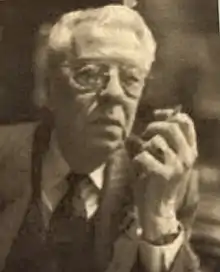Vojin Jelić
Vojin Jelić (Serbian Cyrillic: Војин Јелић; 27 November 1921 – 19 December 2004) was a Croatian Serb writer and poet. His literally work was focused on neo-veristic introspective and retrospective interaction with Serb culture and stories from the Knin region and the wider Dalmatian Hinterland.[2]
Vojin Jelić | |
|---|---|
 Vojin Jelić | |
| Native name | Војин Јелић |
| Born | 27 November 1921 Knin, Kingdom of Serbs, Croats and Slovenes[1] (now Croatia) |
| Died | 19 December 2004 (aged 83) Zagreb, Croatia[1] |
| Alma mater | University of Zagreb |
| Notable awards | Vladimir Nazor Award for Life Achievement |
Jelić's work was translated into Czech, Slovene, Macedonian and English.[3]
Biography
He was born in Knin in 1921.[4] Jelić finished gymnasium in Šibenik in 1940.[3] He went on to study pharmacy in Belgrade.[3]
During the World War II in Yugoslavia Jelić joined Yugoslav Partisans where he joined their units in 1943.[4][3] From 1944 je joined editorijal board of the Srpska riječ ("The Serb Word") magazine.[3]
Following the end of war Jelić initiated forestry studies in Prague in Czechoslovakia in 1945 and he completed his studies in Zagreb 1949.[4][3] He wrote about Serbian culture and stories from the Knin region and Dalmatian Hinterland. He contributed to various publications and worked as a faculty lecturer and cultural advisor in various institutions in the Socialist Republic of Croatia.[4] Jelić was the secretary general of the SKD Prosvjeta.[4]
Jelić distanced himself from public life in Croatia in 1992 during the Croatian War of Independence and after Nedjeljko Mihanović verbally attacked him on ethnic basis.[1] He died in Zagreb in 2004.
Published works
- 1950: Đukin đerdan[5]
- 1952: Ljudi kamenjara[5]
- 1952: Limeni pijetao[5]
- 1952: Ni brige te sivi tiću[5]
- 1953: Anđeli lijepo pjevaju[5]
- 1956: Nebo nema obala[5]
- 1959: Trka slijepih konja[5]
- 1960: Lete slijepi miševi[5]
- 1961: Ne damo vam umrijeti[5]
- 1963: Trči mali život[5]
- 1969: Domino[5]
- 1970: Kirvaj[5]
- 1975: Pobožni đavo[5]
- 1977: Gorki bajami[5]
- 1981: Doživotni grešnici[5]
- 1986: Kozji dvorac[3]
- 1996: Pogledajte svoje ruke[6]
- 2000: Dražba zavičaja[3]
Sources
- "IN MEMORIAM – Književnik Vojin Jelić (1921. – 2004.)". Vjesnik (in Croatian). 2004-12-27. p. 16.
- n.a. (n.d.). "Vojin Jelić – književnik". Serb National Council. Retrieved January 12, 2022.
- Siniša Vuković (30 December 2021). "Sto je godina od rođenja Vojina Jelića, hrvatskog Srbina koji je hrabro razračunao sa zločincima iz svog naroda i izgradio pleter opće humanosti". Slobodna Dalmacija. Retrieved January 13, 2022.
- Nevenka Videk (2005). "Vojin Jelić". Miroslav Krleža Institute of Lexicography. Retrieved January 12, 2022.
- Relić, Ratko (December 2021). "Писац камена и крша" [Writer of Stone and Karst]. Bijela pčela: list za svu djecu (in Serbian). Rijeka: Prosvjeta (272): 12–13.
- n.a. (17 June 2015). "Vojin Jelić (Knin, 27. 11. 1921. – Zagreb, 19. 12. 2004.)". The Town of Knin. Retrieved January 12, 2022.
- A.A. (27 November 2020). "Rođen u Kninu prije 99 godina Vojin Jelić pisao je o nesposobnosti Srba iz Kninske krajine da se otrgnu zovu beogradske politike". Šibenski portal. Retrieved January 12, 2022.